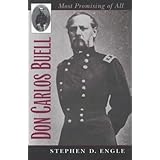
Average Reviews:

(More customer reviews)There are few army commanders from the Civil War that have lacked a full biographical treatment, and up to the present, that gap was nowhere greater than with Major General Don Carlos Buell, who commanded the Army of the Ohio for approximately one year. During that time, he was at the head of the forces that captured Nashville, fought at Shiloh, commanded a wing on the advance to Corinth, and participated in Braxton Bragg's Kentucky invasion that ended with the Battle of Perryville on October 8, 1862.
If one could have polled Abraham Lincoln in early 1862 insofar as which of his army commanders had the greatest "slows," the President might well have been hard-pressed with choosing between eastern commander George B. McClellan and Buell. Indeed, the two (McClellan and Buell) were linked in a common bond of friendship, mutual respect, and a belief in the pursuit of a limited war. Charged with the task of developing a campaign to satisfy Lincoln's desire to "free" eastern Tennessee Unionists from Confederate rule, Buell simply would not, or could not, engage in a campaign with risks he felt were too great. Finally, as his forces ponderously closed in on Chattanooga, Confederate leader Braxton Bragg stole the initiative from Buell, and engaged in a bizarre race back into Kentucky, with the Ohio River city of Louisville the seeming prize. After the seemingly incomprehensible draw at the Battle of Perryville, Buell allowed Bragg to escape back across the Cumberland Mountains, and finally Lincoln and the Washington Administration had had enough. Buell was relieved of command, never to serve in a United States uniform in the field again.
Were there a sizeable cache of Buell war-time correspondence, as for instance, exists for McClellan, the job of Buell's biographer would doubtless been much easier. But Buell rarely expressed himself to others, including subordinates. Much of the interpretation, therefore, was left to Stephen Engle from the official documents and records left as a result of the war. Even so, Engle paints a realistic picture of this Union enigma, and places Buell in the overall context of Federal strategy and Army politics. It would have been nice, for example, to understand Buell's thoughts on slavery, since (his wife was a Southerner, and brought slaves to the marriage) he owned slaves prior to, and during the war. Since Tennessee military governor Andrew Johnson, and Indiana Governor Oliver P. Morton accused Buell of being a Rebel sympathizer, such understanding would have gone far to help place Buell's beliefs in the treatment of civilians and civilian property while he commanded in Johnston's state. But without such a written record, it was up to Engle to draw conclusions on his own.
Part of the problem in understanding Buell rests with the fact that to do so, one must come to grips with his two major foils - friend George B. McClellan, and nemesis Henry W. Halleck. And here, Engle does a very nice job of bringing in these two other men, and positioning Buell within the context of the three men's goals and ambitions (in Buell's case, it was more one of no ambitions versus the lofty ambitions of the other two). Here, perhaps, is the strength of the work, and Engle well balances this very disparate trio.
The Don Carlos Buell that emerges in this work is a man sometimes incomprehensible for his attitudes and actions, but at least understandable for his consistency in those very attributes. Don Carlos Buell: Most Promising of All (a line written by Federal General John Pope, of all people) is a must read for anyone interested in the early history of the western theater, and the man that figured so prominently in it
Click Here to see more reviews about: Don Carlos Buell: Most Promising of All (Civil War America)
"A conservative Democrat who argued for limited war aims, Buell viewed the Civil War as a contest to restore the antebellum Union rather, than a struggle to bring significant social change to the slaveholding South. Stephen Engle explores the effects that this attitude - one shared by a number of other Union officers early in the war - had on the Northern high command and on political-military relations. He examines Buell's disputes with such figures as Andrew Johnson (then military governor of Tennessee), Henry W. Halleck, George B. McClellan, and Abraham Lincoln. In addition, Engle offers a detailed look at events in the Western Theater during the fall and winter of 1862 and shows how quarreling among Union commanders slowed Northern progress in that vital region."--BOOK JACKET. "Engle also devotes considerable attention to the ramifications within the Army of the Ohio of its commander's proslavery leanings. Buell's orders and pronouncements concerning contraband slaves and the treatment of Confederate civilians placed him at odds with a significant portion of the men under his command - a fact that suggests that antislavery sentiment within the ranks of the Union army was more pronounced than previously believed."--BOOK JACKET.
Click here for more information about Don Carlos Buell: Most Promising of All (Civil War America)

No comments:
Post a Comment